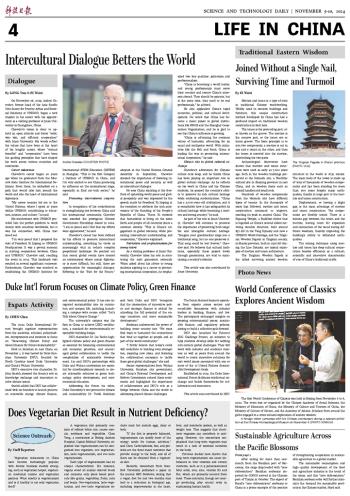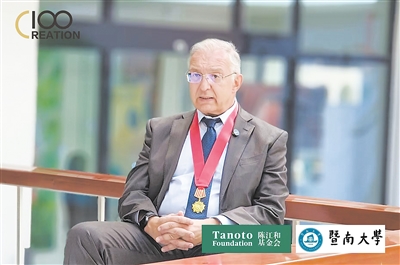
 Intercultural Dialogue Betters the World
Intercultural Dialogue Betters the World World Conference of Classics Explores Ancient Wisdom
World Conference of Classics Explores Ancient Wisdom Joined Without a Single Nail, Surviving Time and Turmoil
Joined Without a Single Nail, Surviving Time and Turmoil Duke Int'l Forum Focuses on Climate Policy, Green Finance
Duke Int'l Forum Focuses on Climate Policy, Green Finance Does Vegetarian Diet Result in Nutrient Deficiency?
Does Vegetarian Diet Result in Nutrient Deficiency? Sustainable Agriculture Across the Pacific Blossoms
Sustainable Agriculture Across the Pacific Blossoms
 |
| Andrei Chevelev. (COURTESY PHOTO) |
On November 28, 2023, Andrei Chevelev, former head of the Asia-Pacific Unit Sector for Priority Africa and External Relations at UNESCO, began a new chapter in his career with his appointment as a visiting professor at Jinan University in Guangzhou, China.
Chevelev's vision is clear: to uphold an open attitude and foster "solid, win-win, and efficient cooperation" with Jinan University. His words reflect the values that have been at the heart of his lengthy career, where "mutual benefits" and "cooperation" have been the guiding principles that have shaped his work across various countries and continents.
Career milestones
Chevelev's career began 40 years ago when he graduated from the Moscow State Institute for International Relations. From there, he embarked on a path that would take him around the world and into the heart of international diplomacy.
"My career journey led me to the United Nations, where I spent 27 years within UNESCO, contributing to education, science, and culture," he said.
His involvement with UNESCO provided him the perfect platform to work closely with countries worldwide, but it was his connection with China that stood out.
"I'm very proud that I prepared the visit of President Xi Jinping to UNESCO Headquarters. It was a pivotal moment in starting cooperation between China and UNESCO," Chevelev said, recalling the event in 2014. This landmark visit resulted in several significant outcomes. Furthermore, Chevelev was involved in establishing the UNESCO Institute for International STEM Education (IISTEM) in Shanghai. "This is the first Category 1 Institute of UNESCO in China, and I'm very excited to see China promoting its influence on the international stage, especially in [the] sci-tech sector," he said.
Promoting intercultural cooperation
In recognition of his contributions to strengthening ties between China and the international community, Chevelev was awarded the prestigious Chinese Government Friendship Award in 2024. "I am so proud and I feel that my efforts were appreciated," he said.
Chevelev's career has been defined by his efforts to promote intercultural understanding, something he views as increasingly vital in today's complex geopolitical landscape. He pointed out that recent global events have created an environment where casual diplomacy is more difficult, but still, there are opportunities for meaningful dialogue. Referring to the "Pact for the Future," adopted at the United Nations General Assembly in September, Chevelev stressed the importance of fostering international peace and security, as well as intercultural dialogue.
He sees China standing at the forefront of upholding world peace and global prosperity and was impressed by the speech made by President Xi Jinping at the reception to celebrate the 75th anniversary of the founding of the People's Republic of China. There, Xi stressed that humankind is living on the same Earth and people of all countries share a common destiny. "This is China's engagement in global relations, while promoting intercultural understanding and cooperation," Chevelev explained.
Patriotism and professionalism for young talent
As a visiting professor at Jinan University, Chevelev takes his role in mentoring the next generation seriously. When asked about his advice to young students aspiring to a career in promoting international cooperation, he emphasized two key qualities: patriotism and professionalism.
"China is becoming a world leader, and young professionals must serve their country and ensure China's interests abroad. They should be patriots, but at the same time, they need to be real professionals," he advised.
He also applauded China's rapid economic, political, and cultural development. He noted that China has become a major player in global institutions like BRICS and the Shanghai Cooperation Organization, and he is glad to see that China's influence is growing.
"China is advancing the common values of humanity, advocating for an equal and multipolar world. With initiatives like the Belt and Road, China is leading the way in promoting international cooperation," he said.
China's role in global cultural exchange
Chevelev's admiration for Chinese culture runs deep, and he thinks China has been playing an important role in global cultural exchange. As he reflects on his work in China and his Chinese students, he praised the country's ability to preserve its rich cultural heritage while embracing modernization. "China has a 5,000-year-old civilization, and it is remarkable how it has safeguarded its cultural heritage while becoming a modern and strong country," he said.
As part of his role at Jinan University, Chevelev will continue to promote the importance of preserving both tangible and intangible cultural heritage. "Imagine your grandmother sings you a traditional song, but no one preserves it. That song could be lost forever," Chevelev said. He believes that cultural traditions, especially those passed down through generations, are vital to maintaining a country's identity.
This article was also contributed by Jinan University.






